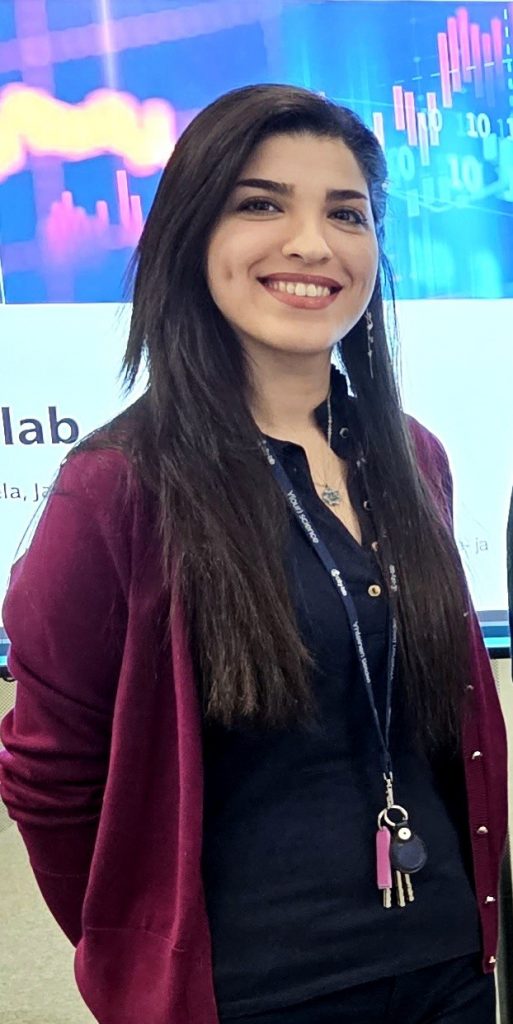Faezeh Heidari: Do not let your failures to define you, let them teach you
My name is Faezeh, originally from Iran. I am currently a Ph.D. researcher in the Neuro-Innovation Ph.D. programme in the Clinical Neuroscience and Neuroimaging field, at the Department of Neurology, Institute of Clinical Medicine, University of Eastern Finland. I firmly believe that the notion of “impossible” is merely an opinion, and it substantially depends on harsh efforts from several small steps toward reaching a summit tip.
Several years ago, I embarked on a journey toward a lofty goal, and today, I find myself realizing that aspiration. It all began with my decision to pursue a bachelor’s degree in the field of radiology, and practically at the department of radiology, experiencing my first teamwork along with my colleagues to learn about the technical part of my field in radiology, CT, and MRI. I enriched my imaging ability in the hospital during COVID-19 and my imaging proficiency further flourished during the challenging times of the COVID-19 pandemic. Amidst the crisis, I not only enhanced my skills but also initiated two projects—one involving in evaluation of Local Dose Reference Level (LDRL) and effective Dose of patient’s body during radiological protocols and the other exploring the pathology effects of the coronavirus on the lungs. This endeavor not only deepened my understanding of the virus’s impact but also unveiled the intricate relationship between its clinical manifestations and CT findings, and it gave me the worthwhile opportunity to pursue my education in imaging until I found myself in Cognitive Neuroscience during my master.

During my master’s program at the Iran University of Medical Science, I delved into medical physics with a focus on MRI imaging. My thesis centered on extracting the functional connectivity of the primary olfactory and working memory regions using fMRI. This involved delivering odor stimuli and implementing a memory related psychological task developed through a Python program. For pre-processing and post-processing tasks, I utilized MATLAB-based and fMRI toolboxes. Simultaneously, I collaborated with colleagues on various projects, including the application of gambling and attention cognitive tasks to evaluate decision-making and selective attention. We also investigated resting-state brain networks during the breathing of inert air and air mixed with odor, utilizing fMRI.
Throughout my master’s program, I engaged in a significant collaboration with King’s College London (KCL) on “Interpretable deep learning in brain medical imaging: a systematic literature review” for enhancing the diagnostic processes of neurodegenerative disorders. Currently, I have initiated a new collaboration remotely with colleagues in the UK, further expanding my network and contributing to ongoing research endeavors.
My Ph.D. Project
Persisting in this journey, guided by the belief that every hardship harbours have a golden opportunity, I have encountered numerous challenges during this pathway related to enriching skills needed to gain my goal. Even if whenever I came across sustained failures, I was not disappointed, and tried to find my weakness points and concentrated on them to be converted to my strength. Sometimes, I just take a look at the whole path which I had gone through, it encourages me to keep up the hardships with more powerful steps and positive perspectives. Each setback and success have been a lesson in resilience, reinforcing my determination not to surrender. Although my ultimate goal may take time to materialize, its profound meaning continues to drive me forward.
The crux of my learning has been the realization that monumental goals are achieved through persistent and substantial efforts. Currently, I am advancing in my Ph.D. under the supervision of Prof. Reetta Kälviäinen and Adj Prof. Alejandra Sierra Lopez. My research is dedicated to unraveling the pathology of epilepsy, employing modern multimodal imaging techniques. The objective is to establish connection between clinical MRI and comprehensive analyses encompassing systematic, molecular, functional, histological, and morphological aspects, all conducted on the same human resected tissue.
This endeavour is part of a vast multidisciplinary research group, contributing to the larger framework of the multimodal project. My specific project aims to enhance the identification of the epileptogenic zone (EZ) by scrutinizing the brain at two distinct purposes.
My project aims to enhance the identification of EZ by assessing the brain at two scales:
- Global overview of patients with epilepsy by integrating comprehensive pre-operative analyses
- Focal overview on samples resected from the same patients by assessing tissue morphology with ex vivo MRI and histology, network functionality with multielectrode arrays (MEAs) and cellular heterogenicity with single cell sequencing and spatial transcriptomics.
Now I am going to research more and figure out how it could be effective to improve pre- and post-operative diagnosis, pinpoint novel therapeutic targets and stratification of patients for anti-seizure medication and surgical treatment in conjunction with my colleagues. Ultimately, this will improve the treatment outcomes and quality of life of drug-resistant patients with epilepsy. Next I will attend Kuopio Epilepsy Symposium (March 13-15, 2024) and I warmly invite everybody else to participate either at site in Kuopio or remotely.
Faezeh Heidari works as a doctoral researcher in the Neuro-Innovation PhD Programme. Her research focuses on enhancing the identification of the epileptogenic zone.